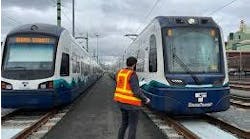ScotRail drivers are shunning their own trains because they are too cramped and uncomfortable.
Members of the drivers' union Aslef have chosen to travel by intercity train to a conference in Inverness next month because they say ScotRail's trains are not good for longer journeys.
The delegation to the STUC annual congress will make the 180-mile trip from Edinburgh via Stirling in a 35-year-old East Coast train - Scotland's oldest - rather than ScotRail's more modern rolling stock. Kevin Lindsay, Aslef's Scottish secretary, said he had booked seats for the three-and-a-half hour journey with East Coast because its trains were more comfortable.
He described ScotRail's class 170 Turbostar trains, used on routes between the central belt and Inverness and Aberdeen, as more suited to commuter journeys.
"I know they are not comfortable, to the point that we have got a conference in Inverness in a couple of weeks' time and we have already booked seats on the East Coast train. That's train drivers choosing to go that way. I think that speaks volumes."
The drivers' decision follows criticism from SNP backbench MSP Maureen Watt, who described the ScotRail carriages as "horrible".
Among the complaints most often levelled at ScotRail trains are lack of leg room, badly designed seats, limited luggage space, and cramped toilets.
The operator's Turbostar carriages also have their engines underneath, which critics say make them noisier, less spacious and less comfortable. By contrast the locomotive-hauled high-speed trains, operated by East Coast, which have been running on the Inverness and Aberdeen to London route since the 70s, offer a smoother, quieter journey in roomier carriages, passengers claim.
Lindsay called for new ScotRail trains suitable for longer journeys, which make passenger comfort a priority.
He said the problem was caused by ScotRail using the same type of train on a variety of routes, and added: "It's more of a commuter sort of train ScotRail are running to Aberdeen, and as such it's not as popular.
Watt, convener of Holyrood's infrastructure committee and MSP for Aberdeen South and North Kincardine, said: "Why can't we be urging ScotRail to say, 'Actually from Aberdeen and Inverness to Edinburgh and/or Glasgow it has to be a different type of train that's more comfortable and more suitable for a longer journey.' Because, quite frankly, the type of carriages they're running at the moment are horrible."
Lindsay, who was giving evidence to the committee on the next ScotRail franchise from 2014, said its trains on the Glasgow-Mallaig line, voted one of the most scenic rail journeys in the world, were even worse. "The West Highland line is one of the most beautiful you are ever going to take in Scotland and it's one of the most uncomfortable," he said.
A ScotRail spokesman said Lindsay's comments were disappointing because "he is fully aware we deliver a contracted service which requires the company to maintain the specified fleet of rolling stock.
"Any changes to the contracted service, including rolling stock, must be decided by Scottish ministers."
The Scottish Government acknowledged in its consultation on the new franchise that the trains "are not perceived by some passengers as appropriate for these longer journeys".
It stated: "We are currently considering what options there could be for improving this situation, and will be looking for bidders for the next franchise to put forward some solutions."
Copyright 2008 LexisNexis, a division of Reed Elsevier Inc. All rights reserved.
Terms and Conditions | Privacy Policy


